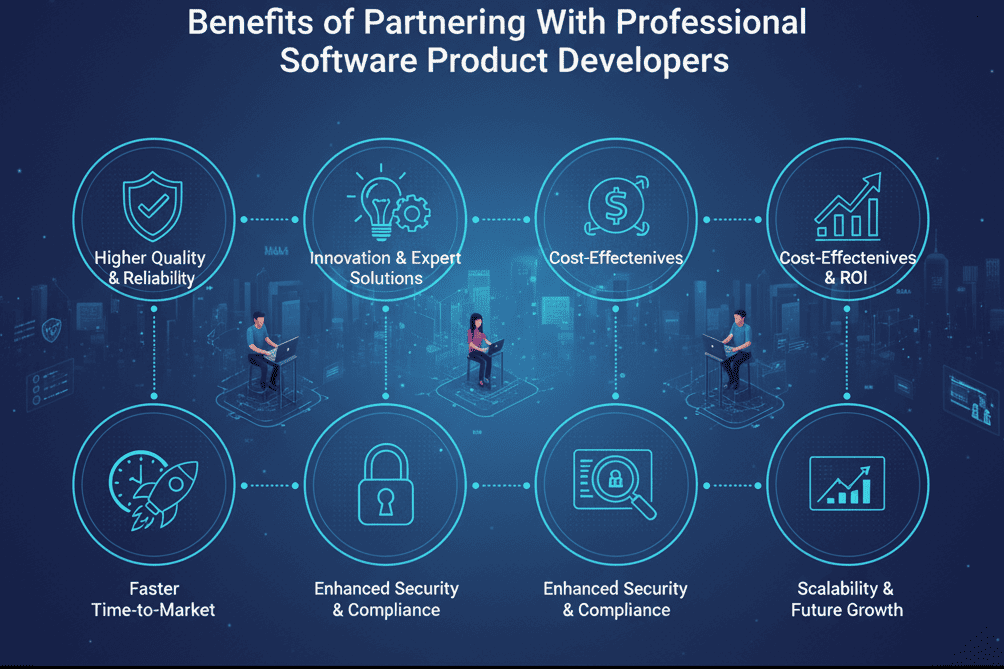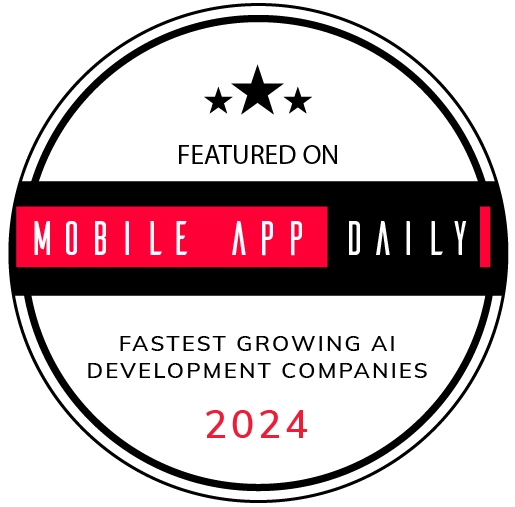Introduction
Every successful startup begins with a powerful idea — but turning that idea into a functional, scalable, and market-ready product requires more than passion. It takes technical expertise, sound architecture, and the right execution strategy. This is where professional software product development services make all the difference.
In a fast-moving market, startups must build quickly, validate early, and scale efficiently. Partnering with an experienced development team enables founders to turn vision into a stable, secure, and user-focused product — one that can adapt to change while maintaining performance and profitability.
What Are Software Product Development Services?
Software product development services cover every stage of building digital solutions — from concept and design to deployment and post-launch support. These services help startups minimize technical risk, improve time-to-market, and ensure that the product meets user and business requirements.
| Stage | Description |
|---|---|
| Ideation & Planning | Market research, competitor analysis, and defining core objectives. |
| UI/UX Design | Designing interfaces that are intuitive and user-centric. |
| Development | Coding and building core product functionality using the right tech stack. |
| Testing & QA | Verifying reliability, security, and performance. |
| Deployment & Maintenance | Launching and scaling through cloud platforms and ongoing support. |
These structured phases ensure startups can launch with confidence while maintaining room for iteration and growth.
Also, If you’re exploring how technology and analytics are transforming entrepreneurship, The Future of Startup Consulting: Data-Driven Decisions for Entrepreneurs provides a detailed look at this shift. The article explains how data-driven insights empower startups to make smarter, faster, and more strategic decisions in an increasingly competitive business landscape.
Why Startups Struggle Without Professional Help
Startups often begin with energy and vision, but lack the deep technical foundation needed to execute efficiently. Without professional development, they face common pitfalls such as:
- Project delays due to unclear scope or poor planning.
- High costs caused by rework or inefficient architecture.
- Limited scalability from short-term coding practices.
- Poor user experience due to design or performance flaws.
Professional product development teams eliminate these risks with clear roadmaps, expert architecture, and agile delivery processes that align with business objectives.

Benefits of Partnering With Professional Software Product Developers
a. Access to Specialized Skills
Hiring a team of experts gives startups access to experienced designers, developers, and architects who understand multiple frameworks and technologies. Instead of spending months recruiting, startups can hire dedicated app developers by App Vertices to accelerate product delivery.
b. Faster Time-to-Market
Through agile sprints and iterative development, startups can release MVPs quickly, collect user feedback, and refine products faster — gaining a crucial first-mover advantage.
c. Cost Efficiency
Working with professionals saves startups from unnecessary infrastructure and hiring expenses. You pay for results, not trial and error.
d. Scalability and Maintenance
A professional-built architecture grows with your user base. Many startups integrate cloud migration services by App Vertices to ensure performance stability, uptime, and lower operational costs.
e. Advanced Tools & Technology
Access to advanced frameworks, APIs, and automation tools ensures products are future-ready — allowing startups to leverage AI, ML, or IoT right from the start.
Real-World Use Cases: How Startups Leverage Product Development
Software product development empowers startups to turn ideas into market-ready applications across industries.
| Industry | Example Use Case | Development Focus |
|---|---|---|
| AI & Automation | Chatbots and virtual assistants | NLP, AI integration |
| Transportation | Ride-hailing and logistics apps | GPS, secure payments |
| Travel & Tourism | Personalized trip planners | Predictive analytics |
| eCommerce | Online retail apps | Seamless checkout, real-time inventory |
| Healthcare | Patient management platforms | Compliance, telehealth |
| Real Estate | Realtor and listing platforms | CRM integration, location APIs |
Real projects show how startups transform through expert development:
- VertexAI-Chat – Smart Business AI Chatbot: An intelligent chatbot that automates communication and customer support through natural language processing.
- VertexRide – Smart Ride-Hailing App: A full-featured mobility platform with live tracking, in-app payments, and optimized routing for drivers and users.
- Triploom – AI Travel Assistant: A travel companion app powered by AI, helping users plan trips with predictive recommendations and real-time updates.
- Interactive eCommerce Mobile Application for a Texas-Based Entrepreneur: A modern shopping platform improving engagement and sales efficiency.
- Empowering Netty Bell with a Seamless Cross-Platform eCommerce App: A user-friendly retail solution integrating real-time product and order management.
- Enhancing Patient Care with a Modern, Intuitive Mobile Experience: A healthcare app designed for medical scheduling, patient communication, and accessibility.
- MVP Development for a Dentist Discovery App: A location-based solution connecting users with dental professionals for fast discovery and booking.
- Real Estate Solution for Houston-Based Realtors: A digital property management system streamlining listing, communication, and sales tracking.
Each case reflects a startup transforming through technology — moving from concept to execution with scalable, user-focused solutions.
The Software Product Development Lifecycle for Startups
Professional teams follow a well-defined lifecycle to ensure efficiency and transparency at every stage.
| Phase | Objective | Outcome |
|---|---|---|
| Discovery | Identify business goals and user needs | Feature roadmap |
| Design | Build user flows and wireframes | Interactive prototypes |
| Development | Code and integrate core systems | Working product |
| Testing | QA, performance, and security validation | Stable, reliable build |
| Deployment | Launch to production or app stores | User-ready release |
| Maintenance | Ongoing support and updates | Continuous improvement |
This agile model allows startups to validate assumptions, test features early, and optimize continuously.
Why Outsourcing Beats In-House for Startups
| Factor | In-House Team | External Partner |
|---|---|---|
| Cost | High hiring and training costs | Pay per milestone |
| Time | Slower onboarding | Rapid kickoff |
| Expertise | Limited scope | Access to multi-domain experts |
| Scalability | Fixed capacity | Flexible scaling |
| Quality | Varies by experience | Standardized testing protocols |
Outsourcing helps startups stay lean and agile — freeing up internal teams to focus on product strategy and market growth.
The Role of Cloud and Emerging Technologies
Modern startups rely on the cloud to handle scale, security, and speed. Cloud-native architectures allow on-demand scaling and global access.
Emerging Technologies Driving Innovation
- AI/ML – Personalized recommendations, predictive analytics
- IoT – Smart systems and connected devices
- Blockchain – Secure data exchange and transactions
- AR/VR – Immersive customer experiences
Integrating these technologies early allows startups to future-proof their products and stand out in competitive markets.
How Startups Gain Through Professional Development
Professional development partners provide far more than coding — they deliver an ecosystem for success:
- Strategic Roadmaps that align tech with business objectives.
- End-to-End Product Management ensuring quality and performance.
- Dedicated Teams that adapt as product needs evolve.
- Continuous Optimization using real-time analytics and cloud performance monitoring.
These capabilities turn startups into digital-first enterprises ready to compete at scale.
Also, Short-form video platforms have redefined how users consume and share content online. With TikTok leading the trend, many alternative apps have emerged, offering new creative tools and audience experiences. To explore these platforms in depth, check out this detailed guide on TikTok-like apps for short videos in 2025, which highlights the top options, key features, and trends shaping the next phase of social video engagement.
Using Case Studies to Drive Confidence
Each real-world project demonstrates how thoughtful product engineering transforms startup potential into measurable success.
- VertexAI-Chat shows how AI-powered automation enhances business efficiency.
- VertexRide illustrates the scalability of on-demand ecosystems.
- Triploom highlights the value of predictive personalization in travel.
- Interactive eCommerce App shows how UI/UX can drive customer loyalty.
- Netty Bell’s Cross-Platform App exemplifies smooth multi-device retail experiences.
- Patient Care App demonstrates digital innovation in healthcare.
- Dentist Discovery MVP emphasizes lean, market-driven development.
- Real Estate Solution reveals how modern tools can simplify communication and sales.
Together, these stories show how startups thrive when product strategy, design, and technology align to create tangible business outcomes.
(Explore all detailed project outcomes on the Case Studies page.)
Metrics That Define Software Development Success
| Metric | Purpose |
|---|---|
| Time to Market | Tracks how quickly a product launches |
| User Retention | Measures engagement and satisfaction |
| Scalability Efficiency | Evaluates cloud and infrastructure readiness |
| Customer Acquisition Cost (CAC) | Reflects efficiency of marketing efforts |
| System Uptime | Indicates reliability and performance stability |
These KPIs help startups track success across both technical and business dimensions.
Common Startup Mistakes (and How to Avoid Them)
- Skipping MVP Validation: Testing assumptions with real users early prevents wasted effort.
- Neglecting UX: Even the best functionality fails if users find it confusing.
- Overcomplicating Features: Start simple and evolve with data-driven insights.
- Ignoring Post-Launch Maintenance: Continuous updates are key to long-term survival.
- Underestimating Testing: Proper QA ensures reliability and brand trust.
Professional software development mitigates these risks by blending structured design, continuous testing, and adaptive scaling.
The Future of Software Product Development
The next era of software development will be defined by automation, AI-driven coding, and sustainability. Startups that adopt these trends early will stay competitive.
Trends to Watch:
- AI-assisted programming tools
- Microservices and modular app design
- Continuous deployment pipelines
- Sustainable, energy-efficient cloud computing
As digital ecosystems evolve, startups that invest in structured, scalable software foundations will have a long-term edge.
Conclusion
Innovation is the heart of every startup, but execution determines success. Professional software product development services bridge that gap — transforming ideas into reliable, market-ready products that scale.
From intelligent chat systems like VertexAI-Chat to mobility, healthcare, eCommerce, and real estate solutions, these real-world projects prove one thing: when expertise meets vision, startups grow faster, scale smarter, and build products users truly love.
If your startup is preparing to launch or scale, now is the time to invest in expert development guidance that ensures stability, scalability, and sustainable growth.









